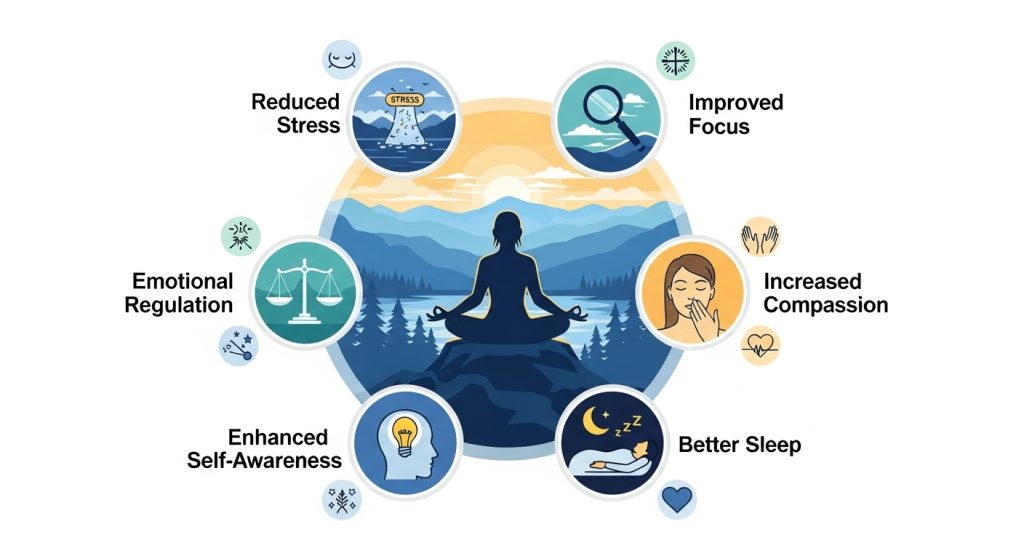Why Mindfulness Matters More Than Ever Today
Imagine this: your phone buzzes again. Another notification lights up the screen. Emails keep piling in, your thoughts race from one task to the next, and even when you finally sit down to relax, your mind refuses to slow down. Sound familiar? For many, this constant mental noise has become the norm leaving people feeling overwhelmed, anxious, and disconnected from themselves.
Despite all the tools and technology meant to make life easier, stress levels continue to rise. People are craving something simple, accessible, and effective to help them feel grounded again. That’s where mindfulness meditation steps in.
But what are the real benefits of mindfulness meditation? Why has it become such a powerful tool for emotional and mental wellness? And more importantly, what mindfulness meditation helps with on a daily basis?
In this article, we’ll explore the science-backed advantages of mindfulness, including emotional balance, cognitive clarity, physical well-being, and how integrating mindfulness into your routine can enhance your entire way of living.
What Mindfulness Meditation Actually Is
At its core, mindfulness is the practice of paying attention to the present moment without judgment. It’s about tuning in to your thoughts, emotions, and sensations with awareness, rather than letting them run on autopilot.
Mindfulness meditation strengthens this awareness through intentional focus. Whether you’re observing your breath, noticing sensations, or simply grounding yourself in the moment, each practice builds a deeper connection between your mind and body.
A common myth is that mindfulness is about “emptying the mind.” In reality, it’s about becoming aware of what is happening in your mind rather than trying to shut it off. You’re not trying to force silence—you’re learning to observe your thoughts with more clarity and less attachment.
Understanding this foundation sets the stage for why mindfulness works so effectively across so many areas of life.
The Science Behind Mindfulness: How It Changes the Brain
Modern neuroscience has made one thing clear: mindfulness meditation doesn’t just make you feel better—it literally reshapes the brain.
Research shows several key changes:
1. Reduced Amygdala Activity (Stress Center)
The amygdala, which triggers your fight-or-flight response, becomes less reactive with consistent mindfulness practice. This means you become less likely to spiral into stress or anxiety when challenges arise.
2. Strengthened Prefrontal Cortex (Decision-Making & Focus)
Mindfulness boosts activity in the prefrontal cortex, the part of your brain responsible for reasoning, planning, and self-awareness. This leads to better emotional regulation and clearer thinking.
3. Improved Connectivity
Mindfulness helps different brain regions work more cohesively, enhancing self-control, emotional balance, and concentration.
4. Reduced Rumination
By bringing attention back to the present, mindfulness interrupts the mental loops that fuel overthinking and anxiety.
The science is powerful and it explains why so many people experience life-changing benefits through consistent practice.
Mental Health Benefits: Calm, Clarity, and Emotional Balance
For many, the biggest benefits of mindfulness meditation come from its impact on mental and emotional health.
1. Reduced Stress and Anxiety
By calming the nervous system and helping the mind process stress more effectively, mindfulness makes it easier to stay grounded during challenging moments.
2. Improved Mood
Regular practitioners often report feeling more positive, balanced, and emotionally resilient.
3. Lower Symptoms of Depression
While not a medical treatment, mindfulness can support emotional healing by reducing rumination and strengthening emotional awareness.
4. Better Management of Difficult Thoughts
Instead of being pulled into negative thinking, mindfulness teaches you to observe thoughts with distance—reducing overwhelm.
5. More Intentional Responses
Mindfulness helps you respond instead of react. When emotions run high, awareness gives you space to choose your next step with clarity.
Physical Health Benefits: The Mind-Body Connection in Action
Mental and physical health are intertwined, and mindfulness supports both in meaningful ways.
1. Reduced Stress-Related Physical Symptoms
Things like headaches, muscle tension, and fatigue often improve as stress levels decline.
2. Better Sleep
Mindfulness calms the mind and nervous system, making it easier to fall asleep and stay asleep.
3. Enhanced Immune Function
Regular mindfulness has been linked to reduced inflammation and improved immunity—showing how powerful relaxation can be for physical health.
4. Less Muscle Tightness
The body often stores emotional stress. Mindfulness releases tension by creating awareness and relaxation.
5. Lower Cortisol Levels
As the stress hormone decreases, your body functions more efficiently and feels more at ease.
Cognitive Benefits: Sharper Focus and Better Decision-Making
Mindfulness is also a powerful tool for enhancing cognitive performance.
1. Increased Concentration
Mindfulness trains your attention like a muscle, helping you stay focused for longer periods.
2. Better Memory
By reducing distractions, mindfulness improves your ability to retain and recall information.
3. Cognitive Flexibility
You become more adaptable, creative, and open to new solutions.
4. Clearer Thinking
With less mental clutter, decision-making becomes easier and more intentional.
Relationship & Social Benefits: Mindfulness in Interactions
Mindfulness isn’t just a solo practice it deeply impacts how we show up for others.
1. Better Communication
By listening fully, you improve understanding and reduce misunderstandings.
2. Less Conflict
Mindfulness helps regulate emotions, preventing reactive or impulsive responses.
3. More Empathy
As your self-awareness grows, so does your ability to understand others.
4. Deeper Connections
People feel more present, engaged, and authentic in mindful interactions.
Everyday Life Benefits: Living With More Presence & Purpose
Mindfulness doesn’t only happen on the meditation cushion it shows up in daily experiences.
1. Greater Appreciation for Small Moments
Ordinary tasks—like sipping coffee or taking a walk become richer and more enjoyable.
2. Less Burnout
Mindfulness builds internal balance, helping you manage responsibilities without feeling depleted.
3. More Intentional Living
Your choices become more aligned with your values, not driven by stress or impulse.
4. Practical Everyday Examples
Mindfulness can transform:
- Your morning routine
- How you react to stress
- How you handle conversations
- Your ability to pause before acting
Small shifts often create big changes.
Common Misconceptions About Mindfulness (And the Truth)
Myth #1: “I don’t have time.”
Short practices even 1 to 3 minutes make a meaningful difference.
Myth #2: “I’m not good at it.”
There is no “right” way. Every experience is part of the practice.
Myth #3: “Mindfulness is spiritual or religious.”
While some traditions use mindfulness, today it’s widely practiced as a secular, science-backed wellness tool.
How to Get Started: Simple, Beginner-Friendly Practices
You don’t need special equipment or long sessions. Here are easy, beginner-friendly ways to start:
1. Short Breathing Exercises
Focus on your breath for two minutes. Inhale. Exhale. Notice.
2. Mindful Walking
Pay attention to your steps, sensations, and surroundings.
3. Guided Meditations
Apps and videos can lead you through simple, calming practices.
4. Build a Gentle Routine
Start small one minute a day and increase gradually.
Consistency matters more than duration.
Conclusion — Your Mind Is Your Home: Make It a Peaceful One
Mindfulness meditation offers powerful, research-backed benefits across emotional, cognitive, and physical health. It supports better relationships, reduces burnout, and brings a deeper sense of presence into daily life. Most importantly, it reminds you that peace is something you can cultivate moment by moment.
Even a few mindful breaths can shift your entire day.







